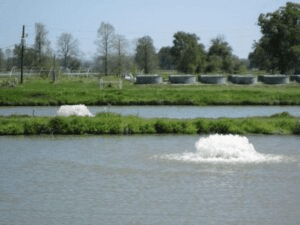Ponds, with their tranquil waters and lush surroundings, offer a sanctuary for both wildlife and humans alike. However, beneath the surface lies a delicate balance that must be maintained to sustain life. This is where pond aeration systems come into play. These innovative mechanisms work tirelessly to enhance the health and vitality of ponds, ensuring that their ecosystems flourish. Let’s delve deeper into the profound benefits that come with installing a pond aeration system.
Table of Contents
Understanding Pond Aeration Systems
Pond aeration systems are ingenious devices designed to address one of the most critical aspects of pond health: oxygenation. They come in various forms, ranging from diffused aeration systems to surface aerators and fountain aerators, each tailored to meet the specific needs of different pond sizes and configurations.
At their core, these systems work by introducing air into the water, typically through the creation of bubbles that rise from the pond’s bottom to its surface. This process facilitates the exchange of gases between the water and the atmosphere, replenishing oxygen levels and promoting overall water quality.
Moreover, pond aeration systems play a crucial role in promoting circulation within the pond. By creating movement and disrupting stagnant areas, they help distribute oxygen and nutrients evenly throughout the water column. This circulation not only oxygenates the water but also prevents stratification, where distinct layers of water form based on temperature and oxygen content.
By maintaining uniform conditions from top to bottom, pond aeration systems ensure a healthy environment for fish and other aquatic organisms to thrive. Additionally, these systems aid in the decomposition of organic matter, reducing the accumulation of harmful gases and preventing foul odors—a common concern for pond owners.
5 Benefits Of Installing A Pond Aeration System
Pond aeration systems serve as the lifeblood of ponds, providing the essential elements needed to sustain vibrant ecosystems. From oxygenation to circulation and nutrient distribution, their impact reverberates throughout the entire pond, fostering a harmonious balance that supports diverse aquatic life. Now, let’s explore the myriad benefits that come with incorporating a pond aeration system into your aquatic oasis.
- Enhanced Oxygen Levels: Adequate oxygen levels are paramount for the survival of fish, plants, and other aquatic organisms. Pond aeration systems excel in this aspect, significantly increasing oxygen concentrations by introducing air into the water. As bubbles rise to the surface, they exchange gases with the atmosphere, replenishing oxygen and driving off harmful gases such as carbon dioxide and hydrogen sulfide. This oxygenation not only sustains aquatic life but also promotes the breakdown of organic matter, mitigating the risk of water quality issues.
- Algae Control: Algae overgrowth is a common concern for pond owners, often leading to murky water and unsightly blooms. Pond aeration systems offer an effective solution by disrupting the conditions favorable to algae growth. By promoting circulation and oxygenation, these systems inhibit the proliferation of algae, preventing them from taking over the pond. Additionally, the increased oxygen levels encourage the growth of beneficial bacteria that compete with algae for nutrients, further suppressing their growth and maintaining water clarity.
- Improved Water Quality: Pond aeration systems play a pivotal role in enhancing water quality by facilitating the breakdown of pollutants and organic debris. As air is introduced into the water, it jumpstarts the natural purification process, promoting the growth of beneficial bacteria that metabolize organic matter. This biological filtration not only reduces nutrient levels but also eliminates foul odors associated with decaying organic material. Moreover, by maintaining uniform conditions throughout the pond, these systems prevent the buildup of stagnant areas where pollutants can accumulate, ensuring pristine water quality for both aquatic life and aesthetic enjoyment.
- Prevention of Stratification: Stagnant ponds are prone to stratification, where distinct layers of water form based on temperature and oxygen content. This stratification can lead to a host of problems, including nutrient imbalances, decreased oxygen levels, and even fish kills. Pond aeration systems address this issue by promoting circulation and mixing the water column, preventing the formation of stratified layers. By maintaining uniform temperature and oxygen distribution from top to bottom, these systems create a conducive environment for aquatic life to thrive year-round.
- Winter Survival for Fish: Cold winter months pose a significant threat to fish residing in ponds, as ice formation can restrict oxygen exchange and trap harmful gases beneath the surface. Pond aeration systems offer a lifeline during these harsh conditions by maintaining a small opening in the ice. This opening allows for vital gas exchange, ensuring that fish have access to oxygen and preventing the buildup of toxic gases such as ammonia and methane. By safeguarding fish during winter hibernation, pond aeration systems contribute to the long-term health and sustainability of the pond ecosystem.
Conclusion
The benefits of installing a pond aeration system are undeniable. From enhancing oxygen levels and controlling algae growth to improving water quality and preventing stratification, these systems offer a holistic approach to pond management. By harnessing the power of aeration, pond owners can create and maintain vibrant ecosystems that support diverse aquatic life. So, whether you’re a seasoned pond enthusiast or a novice caretaker, consider investing in a pond aeration system—it’s a decision that will pay dividends for years to come.

